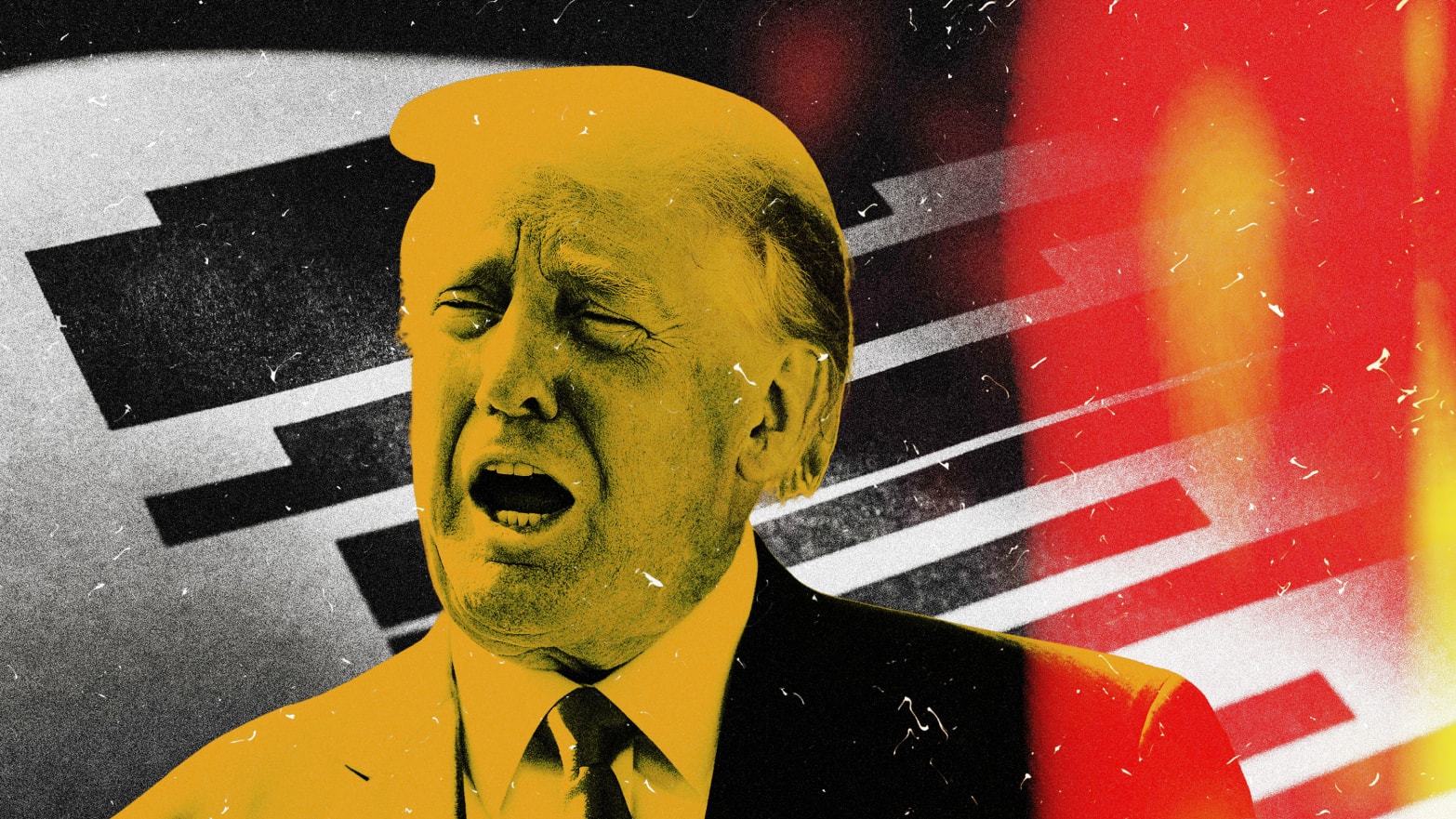Donald Trump hasn’t done himself any favors in loudly and publicly fighting accusations he illegally swiped classified documents from the White House, with the former president’s own words likely to foil his defense, legal experts say.
“The short answer is, no—it’s not a good idea,” Daniel P. Meyer, a national security partner at Tully Rinckey PLLC's Washington, D.C. office, told The Daily Beast.
In a criminal case, Meyer said, “You want to keep your mouth shut, for a very simple reason: the government bears the burden of proving you’re a criminal.”
Meyer, a former naval officer who went on to high-level positions within the Department of Defense Inspector General’s office before entering private practice, said the former president “left so much evidence on the record” by dint of his own statements.
“Donald Trump should have stayed quiet,” Meyer said. “And that’s what he has not done.”
Neama Rahmani, a former federal prosecutor, predicted Trump isn’t likely to wiggle his way out of a conviction this time—saying he already dug his own grave even before he was indicted on Thursday.
“I think of all the possible charges against Trump, the classified documents case was the easiest one to prove,” Rahmani told The Daily Beast.
That’s because tape recordings, social posts, and a raid by the FBI have seemingly confirmed Trump knowingly possessed classified documents outside the White House—and that he may have wrongly thought he was legally permitted to do so.
CNN reported on June 2 that the special prosecutor probing Trump, Jack Smith, uncovered a tape from 2021 in which Trump stated that he possessed a classified document related to a potential attack on Iran. The conversation, recorded by a Trump aide, reportedly came during a discussion with writers working on a memoir for his former chief of staff, Mark Meadows.
During the convo, Trump denied media reports that General Mark Milley, his Joint Chiefs of Staff chair, stopped him from attacking Iran in his final months in office. Instead, he said, he possessed a military document that proved Milley was in favor of an assault. He then acknowledged to the group he wasn’t authorized to show them that document.
That reported admission could be a double-edged sword for Trump, as not only did he admit to possessing a classified document, but he also acknowledged he knew it couldn’t be shown to just anyone.
Sources told CNN that Smith considered the recording an “important” piece of evidence.
“His lawyers are going to argue that the documents were declassified, and that he did so before he left office and that he was authorized to do so,” Rahmani said. “But I don’t think that argument’s going to hold water, because there’s a very specific procedure that you’re supposed to follow.”
Trump has been all over the place while discussing classified documents—sometimes denying he had any, and other times claiming he was legally allowed to possess some. He bizarrely claimed last year—wholly incorrectly—that the president can declassify material “even by thinking about it,” later adding that a president is free to declassify anything they want.
“If you’re the president of the United States, you can declassify just by saying it’s declassified, even by thinking about it,” Trump asserted. “You’re the president. You make that decision.”
Trump said he “declassified everything” he took to Mar-a-Lago —a seemingly clear admission he took documents to his South Florida estate, possibly unknowingly. He doubled down on this belief in posts to Truth Social—where he’s repeatedly insisted he’s innocent.
“HOW CAN THE DOJ POSSIBLY CHARGE ME, WHO DID NOTHING WRONG,” he recently wrote.
Rahmani said Trump’s belief he had the “unfettered discretion to declassify documents” isn’t true, adding that he lost all executive privilege the second he crashed out of office.
Joshua Ritter, a former Los Angeles County prosecutor, said he believes Trump’s statements likely aren’t the “linchpin to the prosecution’s case,” but they aren’t doing the former president any favors, either.
“In any case where a defendant is very vocal and giving lots of statements about an ongoing investigation, it never seems to help them, and always seems to come back to haunt them,” he told The Daily Beast, noting that the U.S. Attorney’s Office will be keeping track of anything and everything Trump said that has any bearing on the prosecution.
National security lawyer Bradley Moss also believes Trump’s actions have spoken louder than his words, and this is what will bury him at a potential trial. Yet, with all that in mind, Trump’s “public remarks, including press statements his office issued regarding return of records to NARA [National Archives and Records Administration], will be relevant and material to the factual foundation of any charges,” Moss told The Daily Beast.
Questions have been raised about why it took so long to indict Trump despite seemingly hoards of evidence against him—including the alleged discovery of top-secret documents during a raid at Mar-a-Lago.
Rahmani said the sheer magnitude of the ordeal—and the polarization surrounding it—meant the feds needed to have an air-tight case before they indicted Trump.
“If you are Merrick Garland, and you are going to take on the most politically charged prosecution in American history, you want to make sure you come correct, and make sure there are no legal or procedural landmines that you’re walking into,” Rahmani said.
Rahmani isn’t sure Trump, a firebrand uncontainable by even the most well-respected lawyers in the country, is through with the incriminating statements just yet.
“This guy will not follow Lawyering 101—just keep your mouth shut,” Rahmani said. “Look, I know he’s doing it for PR and political reasons, but he’s really screwing himself when it comes to these criminal cases…I’m sure his lawyers are incredibly frustrated having to clean up his messes.”
Jamie White, a Michigan-based criminal defense lawyer, said Trump is “the definition of a nightmare client” for that reason. He said Trump’s tendency to go rogue online can turn his attorneys into witnesses themselves, which has happened in the classified documents probe.
Trump, who has burned through numerous lawyers since leaving office, has also not always been steered in the right direction of late, according to Meyer.
“Whoever is advising Trump, and I think of Roger Stone, there is an antique nature to the advice he seems to be getting,” Meyer said. “Trump is acting as if the Presidential Records Act, all of the post-Watergate [laws], were never passed. All of the legal arguments I’m hearing from Trump’s attorneys are 50 years old.”
A voice memo recorded by Evan Corcoran, a Trump attorney, is expected to play a key role in Trump’s prosecution. The recording, obtained by Smith this month, reportedly contains Corcoran’s detailed narration of his work on the classified docs’ probe beginning after he first met with Trump in May 2022, which reportedly provided investigators with an unusually intimate peek behind the curtain for nearly a month-long period.
Such materials are typically protected by attorney-client privilege. However, Corcoran lost the right of privacy to his memo because of something called the “crime-fraud exception,” a provision that allows prosecutors to work around attorney-client privilege if there’s evidence to believe legal advice or legal services were used in furthering a crime.
“I suspect his attorneys run into this ethical dilemma,” White said, ”of their client doing the unthinkable and their advice not being taken, and then they become witnesses—most famously Mr. [Michael] Cohen, who arguably took instructions from Mr. Trump that was corroborated by the Mueller investigation, and he found himself in prison.”
White says America’s political climate is so fractured, he doesn’t expect Trump’s indictment to have the same ramifications it would to a president in the 20th century. Instead, he fears the repercussions if Trump is able to skirt justice despite a “stunning” amount of evidence against him.
“I think they’re probably looking at some of the practical considerations that are important to our country, important to our politics, but at the end of the day, when you’re left with a guy on tape, so to speak, what do you do?” White said. “Does the rule of law still prevail in our country?”
One of those concerns, obviously, will hinge upon whether or not Trump is convicted, and what happens after that.
“You’re going to have to close down an entire prison to incarcerate this man,” White said. “At the same time, nobody is above the law. As soon as we agree that somebody is above the law, the entire system breaks down.”


